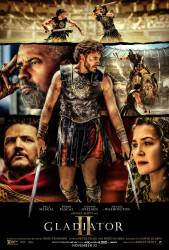
Continuity mistake: Before the first battle in the Colosseum begins, the warrior Glyceo salutes the emperors and they applaud him. Emperor Geta wears golden wrist guards in one shot. In the previous shot, when he is drinking wine, and also in the next, they are gone. (00:56:28)
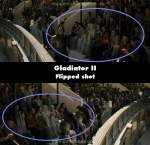
Revealing mistake: Before the big battle between Lucius and Acacius begins, the soldiers arrive at the bleachers, where we see several shots of the people. Check the crowd, and you'll notice it's a flipped shot of the previous people. (01:33:32)
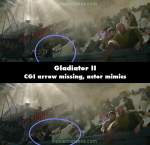
Revealing mistake: During the riot at the bleachers, a soldier grabs an arrow from the quiver, places it on the bow, tightens the string, and aims to shoot. The problem is, he's mimicking all the movements. He didn't pick up an arrow in the first place. Seemingly, someone forgot to place the CGI arrow. (02:09:02)
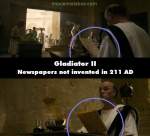
Factual error: After the naval battle, Thraex is waiting for an informant who tips him off about Lucilla and Marcus Acacius's plans. And of course, as a well-educated gentleman of 200 AD, he kills time by reading the newspaper. Wait, what? Needless to say (to anyone but Ridley Scott, probably), ancient Romans wouldn't/couldn't exactly get their news by newspaper, the press having not been invented yet. This one looks so modern in its layout it even has headlines and a proper publication title, "Roma Viridia."
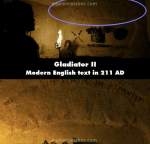
Deliberate mistake: When Lucius is shown Maximus' tomb, the painting on the wall reads, "What we do in life echoes in eternity," in plain perfect modern English language. Of course, it helps audiences relate to the first movie, but it's ludicrous, to say the least.
Factual error: The Numidians defend their city against the Roman invaders using also trebuchets - a type of siege equipment that would only appear in the Middle Ages.
Factual error: In his flashback en route to Rome, young Lucius is shown playing football (soccer) as goalkeeper with his friends in Africa. There is no historic testimony of any ball game in the ancient world with such a close resemblance to modern soccer (exclusive use of feet, rectangular goal, etc.).
Suggested correction: There are a few seconds of kids kicking a ball (coconut) around and a kid guarding two poles. Nothing shows they are actually following the rules of modern soccer. They are not doing an official sport, just a ball game they came up with that happens to look like soccer. There is only one goal too.
It is not an official game, but it's not randomly kicking the ball. It's the way modern kids with a previous knowledge of football would organise. It seems trivial to us, even natural, but as you can see, for instance, on the FIFA website, it is anything but. Games with exclusive use of feet weren't a thing in the Greco-Roman world. What is shown in the movie is meant to resemble something that the modern audience is familiar with, but wasn't at all close to the culture of 2nd century kids in Egypt.
Character mistake: When the MC introduces Lucius and his team during the naval battle, he says, "Today, we relive the battle of Salamis; the Trojans vs the Persians." The battle did involve the Persian empire, but not against "Trojans", but rather the Greeks.
Factual error: While it is true that in ancient Rome naval battles were orchestrated and would occasionally take place in the Colosseum itself, and even that salt water could be used, the logistics of bringing live sharks all the way inland are patently absurd.
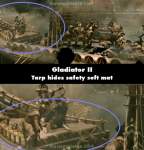
Revealing mistake: During the naval battle, after an underwater shot of a man being eaten by a shark, check the poop deck on the left, and you'll notice a bulky floor with wrinkles around where people fighting and falling bounce on, revealing a tarp hiding a safety mat.
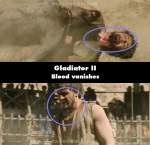
Continuity mistake: After Lucius kills the wild monkey, he's got blood all over his mouth, beard, chin, and neck. When he stands up, he's spotless.
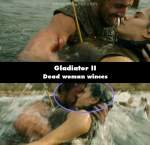
Revealing mistake: When Lucius holds his wife's corpse in the sea, a wave crashes against her and splashes her face. The actress can't help wincing.
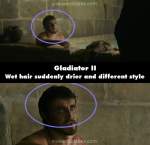
Continuity mistake: After the Virgil quote scene and the fight that follows, Lucius takes a bath. There's a close-up of him saying something about dying in the arena, and his hair is suddenly better brushed and drier. Then it goes back to the previous wet hairstyle.
Factual error: In the Senate scenes, there are a few women in the council. Women couldn't be senators in Rome. To be fair, none is shown raising their hand when Macrinus asks to vote, so it can be argued that they are perhaps not portrayed to be full-fledged members; however, the simple participation in the most important ruling body of the Empire appears to be anachronistic.
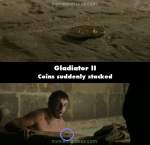
Continuity mistake: Macrinus walks over to where Lucius is bathing and places two coins, one slightly overlapping the other. A shot later, they're stacked.
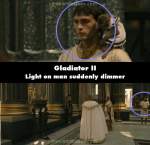
Continuity mistake: When Acacius arrives in Rome and meets with the Emperors, there is a man with a monkey on his shoulder, his face surrounded by bright light. An instant cut later, his face is in the shadows.
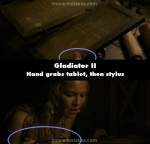
Continuity mistake: When Lucila reads two tablets, her right hand suddenly holds a stylus between instant cuts.
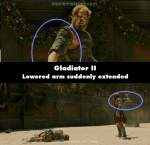
Continuity mistake: Glyceo grabs the sword on the arena floor and extends his right arm. An instant cut later, his arm is lowered, then it cuts back to the previous angle of his arm extended.
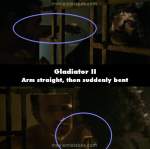
Continuity mistake: When Lucius asks the doctor to give him the prison keys and send a message to the soldiers at Ostia, Lucius' arm is bent around the prison bars, except for a brief shot where it's suddenly straight; then the shot changes and it's bent again.
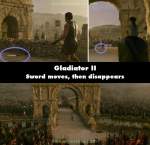
Continuity mistake: When Lucius addresses both armies at the city entry, he throws his sword on the floor ahead of him. He walks around, and from the opposite front angle, one can see the sword behind him. From the immediate opposite angle of his back, the sword is gone.
